- Home
- Salman Rushdie
Quichotte Page 22
Quichotte Read online
Page 22
Suppose there’s a God. Is he an unforgiving God? And if we ought to try to be like him, as we’re told we should, should we be unforgiving too?
* * *
—
QUICHOTTE, A MAN UNUSED to intimate human interactions, but convinced in his heart that until he had faced his sister he would be unready to face his Beloved, did what he always did at moments of confusion or crisis. He stayed in his room and watched TV. The images on the screen calmed and comforted him, and felt true in a way that New York City never had. The city had always struck him as being chaotic, formless, overcrowded, harsh, and possessed of no dominant narrative line. On TV the sitcoms, the soaps, the reality shows, were in sharp contrast to the hurly-burly outside the Blue Yorker motel. They moved as if on tramlines through their well-established moves, twists, and cliffhangers, and arrived at satisfying resolutions. This was what Quichotte wanted of life, shapeliness and firm conclusions. What else was his quest but an effort to extract hidden meaning from the world and by doing so earn himself the happy ending for which he so desperately yearned? He didn’t spend much time on the news and information channels, but as he surfed by them he saw that they, too, sought to impose meaning on the maelstrom of events, and that comforted him. A couple of days sitting there quietly being reassured by the dark metropolitan plot lines of Law & Order: Special Victims Unit (which he had failed to give up; nobody’s perfect) might give him some New York rhythm and the strength to do what he had to get done. He put twenty-dollar bills in Sancho’s pocket and sent him to walk the streets alone. “It’s not so warm anymore,” he told his son. “Here. Take my coat.”
Once the youth had left, Quichotte began channel hopping. What caught his attention on this occasion was not his typically favored fare, but an interview with the celebrated American scientist, entrepreneur, and billionaire of Indian origin Evel Cent. The name Evel Cent was itself an invention, perhaps derived, Quichotte surmised, from the more Indian-sounding Awwal Sant, or something similar. Slick-haired, slender, and underslept, this reinvented man looked every inch like a Bollywood movie star moving from handsome youth into a slightly ragged middle age, and spoke in fast spiky riffs as if hopped up on methedrine, unapologetically using a mixture of the difficult modern vocabulary of high technology and the lingo of modern dystopian fantasy, as if to say, I don’t care if you understand me or not, but I know how to get your attention if I choose to do so. Evel perhaps came from the great daredevil Knievel, and Cent was money, and there was the meaning of his name staring everyone in the face. Although the sound of the name gave off a different odor. Evel Cent, a bad stink. To some people that was what he was, an unpleasant self-promoting capitalist fart, but to others, mostly young others, he seemed like a kind of prophet, and here he was on television, doing a prophet’s work while also justifying the opinions of those who thought him a phony egotist skunk.
What he was talking about today was nothing less than the end of the world, what he described as the growing instability of the continuum or gestalt, which, if the trend continued, he declared, would lead to the crumbling into nothing of the whole of space-time. He would, he said, bring forward the science to support this claim at the proper time. For the moment all he would say was that his admittedly alarming claim was backed by teams of astrophysicists working at the leading universities, including several Nobel laureates. The evidence of disintegration was still inadequate, but it was there. There was much work to do to establish the causes, the extent, and the likely rate of expansion of the Instability. But of its existence he had no doubt at all. The question was, would the human race take this lying down and go meekly into oblivion, or would we, could we, do something about it?
Quichotte thought, The man himself looks like a once beautiful entity that is beginning to fray at the edges.
Evel Cent moved smoothly from eschatology to sales pitch. He and his teams were working on an astonishing project which he called NEXT. NEXT stood for Neighbor Earth Xchange Technology. The concept of parallel space-time continuums, parallel universes and therefore parallel Earths, was no longer disputed by any serious physicists. The question was, where were they, and how could we get there from here? If our universe crumbled into space dust, might we not rescue ourselves by traveling in new kinds of vessels that could jump toward an alternative universe that was still stable? This! he said, now speaking in a series of exclamations accompanied by a jabbing forefinger, is! My dream! A new! Home! For Humanity!
Quichotte was electrified by Evel Cent’s performance. Had he not himself recently written to his Beloved and predicted the end of things? His own inspiration had been love, love as the perfect culmination and therefore conclusion of all things, and perhaps what Evel Cent and his teams of geniuses had perceived was that he, Quichotte, was nearing his goal, and the universe was preparing its last rites in response! Science was confirming what love had driven him intuitively to understand.
This was big. He needed to think about this. He switched off the television set. Something else nagged at his broken memory, something about this man, this Evel Cent. Had they met?
* * *
—
THIS WAS THE DAY on which he began to draft letters to his sister.
Dear H.T. (his first attempt began),
This after a long silence comes from your airhead brother, in the hope that blood may prove thicker than air, and that we may meet again in loving fashion. Socrates, too, was considered an airhead, by the way. In Aristophanes’ play The Clouds, Socrates floats overhead in a balloon basket, getting high so he can elevate his thoughts. At first this seems to mean his wisdom is not down-to-earth. On the other hand, it is only from Socrates’ ivory tower (or basket) that he can put the earth into perspective. Having his head in the clouds grounds him. I do not compare myself to the great philosopher except to say that I, too, have been Johnny Head-in-Air. I, too, have tried to elevate my thoughts.
No, that was plainly too vain and self-regarding. He stopped, crumpled this absurd effort into a ball, and tossed it away. He tried again:
Dear H.T.,
For a long time, in my younger days, my favorite book was Mr. R. Pirsig’s Zen and the Art of Motorcycle Maintenance. (I wish they would make a limited drama series out of ZAAMM, but that’s by the by.) Now that I myself have embarked on a journey across America toward you—yes! I deeply hope that it will not prove to be in vain!—and accompanied by my son—yes! Another thing to tell you about when we meet!—I have been thinking about Mr. R. Pirsig again, and, through Mr. R. Pirsig, about Mr. A. Einstein, whom he quotes as follows: “Man tries to make for himself in the fashion that suits him best a simplified and intelligible picture of the world. He then tries to some extent to substitute this cosmos of his for the world of experience, and thus to overcome it….He makes this cosmos and its construction the pivot of his emotional life in order to find in this way the peace and serenity which he cannot find in the narrow whirlpool of personal experience….The supreme task…is to arrive at those universal elementary laws from which the cosmos can be built up by pure deduction. There is no logical path to these laws; only intuition, resting on sympathetic understanding of experience, can reach them….” I must confess that my personal cosmos no longer brings me serenity or peace, yet I long for them, I long to be in harmony with the whole multitudinous world, and I have understood—very late!—but I hope and pray not too late!—that I can only find the peace for which I long by making peace with you. I am learning that everything is connected, and that includes us.
This, too, he crumpled up and discarded. What a nincompoop he was! What did Einstein have to do with anything happening between the Trampoline and himself? Why could he not speak simply, and from the heart, without wrapping his plea in such highbrow fol-de-rol? He made a third attempt:
Dear H.T.,
It may amuse you to learn that in my antiquity I have become a seeker after wisdom, and beyond wisdom, love,
…he began, but then stopped, and leapt to his feet, because Sancho tumbled into the room, his face bloodied and his clothes torn, having been badly beaten.
* * *
—
AS HE WALKED AROUND the city wearing his father’s cashmere coat, Sancho remembered the white lady at Lake Capote and the unusual leather choker she was wearing around her neck, with a brass buckle at the side, and what looked like a few dangling inches of broken leash. He had thought then it looked like a dog collar, and it wasn’t at all the kind of fashion item a lady like that would wear. At the time, he had dismissed it from his thoughts. Maybe, in their haste to leave the campsite and the heightened tensions of that moment, he had been mistaken.
Now, however, he began to see that there had been no mistake. Or, to put it another way: he began to realize that he was seeing things that other people couldn’t see. One day on Tenth Avenue, a dozen blocks down from the Blue Yorker motel, he saw a drunk woman stamping on a rainbow. This was outside a store selling crystals and incense. A ray of light from the store passed through a prism dangling in the storefront window and created this fortuitous spectrum on the sidewalk. The drunk woman, a big woman dressed all in black and missing several teeth, was trying to smash the rainbow with her feet and swearing profusely as she did so, unleashing a torrent, a drool, of homophobic abuse. Okay, that didn’t have to be a vision, but then there was a change in the light, maybe someone moved a lamp in the store, and the rainbow disappeared, but so did the cursing woman. As if the one engendered the other. The rainbow engendered the hatred. Yeah, he thought. That’s fucked up. Another day, on Madison Avenue among all the clothing stores, he saw three figures dressed all in white including white pointed hoods. That was impossible. This was New York. The Klan wasn’t here at all, let alone wearing couture hoods on Madison. He crossed the avenue to get a closer look but the well-dressed crowd merged briefly ahead of him and then parted again and they were gone. This was insane, Sancho thought. It created in him a kind of ontological dread. There were days—it was just about every day, in point of fact—when the issue of his own reality came back at him and haunted him. His coming into being had been so exceptional, his transition from being a dependent sub-clause of the long sentence that was Quichotte into an independent existence continued to feel so improbable, that he had nightmares about having it all come apart, about his very being flickering like a faulty image on TV, then disintegrating and vanishing; about, in short, death. The arrival of these sightings—he resisted the word visions, which increased his sense of his own unreality—and the increase in their frequency was alarming. He did not tell Quichotte what he was seeing. Some things were better kept to oneself.
Then while he was walking across the park, kicking at the fallen leaves, as darkness fell—not the smartest of moves, he afterwards allowed—he saw, coming toward him, a group of three middle-aged men in suits, white men, carrying briefcases, ordinary and inoffensive in every way—except that around their necks were the same collars he had seen on the white lady of Lake Capote, the same buckles, the same lengths of dangling leash. Who were these dog-collared people? Was this some sort of nationwide cult he had stumbled across?
“You’re staring at us. Why are you staring at us?” The men had stopped, facing Sancho, blocking his path.
Sancho was placatory. “No, sir, not staring. Just walking. Going that way,” he said, pointing.
“He was definitely staring,” said the second man. “That was impolite. But these people, they don’t know manners.”
“They come over here and we pay for their health care,” said the third man.
“We worry about the safety of our womenfolk,” said the first man.
“We don’t know when one of them will go rogue and attack everything we hold dear. We do know they worship alien gods,” said the second man.
“Speak up,” said the third man. “Why are you even looking at us? You people shouldn’t do that. You should not have done that.”
This was impossible, Sancho thought. These were the three least likely-looking thugs in America. These people couldn’t possibly be dangerous. These people were gray, harmless, dull. He took a deep breath and spoke up.
“Your neckwear caught my attention,” he said. Mistake, he immediately realized as he saw their body language change. Moving almost in unison, they set down their briefcases. One of them began to remove his coat.
“Our neckwear,” the first man said.
“Excuse me,” Sancho said. “I understand it’s impolite to stare. I didn’t mean to. But I’ve seen it once before.”
“He has seen our neckwear before,” the second man said. “Can you believe this boy? He’s something. He’s unreal.”
“We’re not wearing any neckwear,” the third man said. “It’s too hot for fucking neckwear. What neckwear is he talking about?”
“I don’t know,” the first man said. “I will ask. What fucking neckwear are you talking about, boy?”
Sancho was bewildered, and now also afraid, and in fear and bewilderment he pointed. “The collars,” he said, “with the broken leashes.”
“Extraordinary,” said the second man. “He compares us to dogs.”
“He thinks we are dogs,” the third man said, “dogs that have broken their leashes.”
“Savage, dangerous dogs that have been unleashed,” the first man said.
“Dogs frothing at the mouth,” the second man said. “Beware of the dogs, am I right?”
“Beware of the fucking dogs,” the third and first men said in unison.
“Because we have been fucking unleashed,” said the second man.
Sancho understood that he had done everything wrong. He had stared when he shouldn’t have stared. He had spoken when he shouldn’t have spoken. Worst of all, he hadn’t run when he should have run. And now they were around him and there was nowhere to run.
And the moral of the story is, he thought, as the punches and kicks began, don’t underestimate gray, dull, middle-aged white men in suits, ever again.
They could easily have killed him, but they didn’t. Maybe he wasn’t worth it. Maybe it was because he was unreal. Maybe it was because they were men who until recently had been tamed and under control and this unleashing, whatever caused it, was something new for them. Maybe they were still getting used to their power. Whatever the reason, they left him on the ground, beaten but alive; they picked up their briefcases, put on their coats, and strolled off into the dusk. “Chimaats!” he called after them. “Khajvuas!” But his voice was too weak for them to hear it. Which was probably just as well.
* * *
—
THE DEMANDS OF PARENTHOOD awoke Quichotte at least partially from the reverie in which he spent the larger portion of his life. He scurried to and fro between the Blue Yorker motel and the local pharmacies and food counters to find hot soup, chicken bowls, cheeseburgers, liniments, Aleve, and bandages, and consequently missed several episodes of The Real Housewives of Atlanta, in spite of his passionate interest in the overly full lips of Kim Zolciak and the firing—alleged! The alleged firing!—of Kenya Moore as a warning to the rest of the cast that they should learn how to keep secrets. Sancho had been lucky. His body was covered in an archipelago of black-and-blues but there didn’t appear to be any bones broken or anything serious damaged inside him. The cashmere coat was dirty, but it, too, had survived. What the boy needed was rest, sympathy, painkillers, and cheeseburgers.
In the trunk of the Chevy Cruze there was a small case containing what remained of the opioid samples Quichotte had carried on behalf of SPI. These he doled out to Sancho in the first few days, but was very careful about quantities. And the sealed container at the bottom of the bag, the one containing the InSmile™ sublingual fentanyl spray, he left sealed and in its place. Sancho recovered quickly, as the young do, but his mood remained dark.
During these days of
Sancho’s convalescence, in which they both spent much time in their darkened room, listening to the noises of sexual pleasure filtering through the walls, and, to obscure these noises, turning up the volume while watching (non-pornographic) TV, only to be told by the management that their neighbors were complaining that the high-volume voices of reality stars on the Bravo channel were putting them off, so to speak, their stroke…during these stressful days they didn’t speak much, except when Sancho wanted to express a need, and Quichotte did his best to satisfy it. They were both preoccupied by their thoughts.
Sancho’s thoughts were all of escape. Get me out of here. I don’t care if he’s my father, and loves me, and would be devastated etc., I need to strike out on my own. Way back when we were on the road I thought I might betray him by stealing his beloved Salma from him. I don’t care about that now. The betrayal I need is my freedom. He said none of this aloud, but it bubbled in him like a stew.
Quichotte, by contrast, was full of self-reproach. Sancho’s injuries had plunged the older man into a condition of profound doubt, in which he questioned everything—how he had led his life, and even the hunger for a child that had brought Sancho into being. He had been something close to homeless for a very long time, living out of the trunk of his car with pit stops in cheap motels…what business did such a person have bringing a child into the world? He felt he should apologize to Sancho, but knew that if he did so Sancho would hear it wrongly, would think his father was wishing that he had never been born.

 Shame
Shame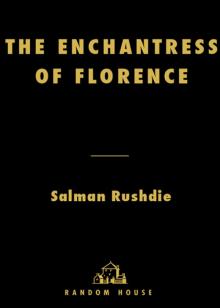 The Enchantress of Florence
The Enchantress of Florence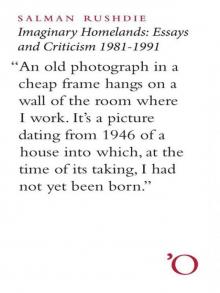 Imaginary Homelands: Essays and Criticism 1981-1991
Imaginary Homelands: Essays and Criticism 1981-1991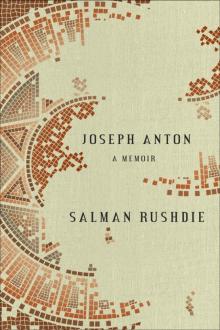 Joseph Anton: A Memoir
Joseph Anton: A Memoir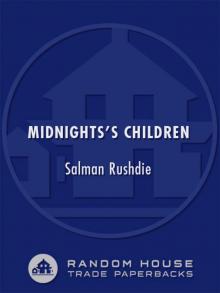 Midnight's Children
Midnight's Children East, West: Stories
East, West: Stories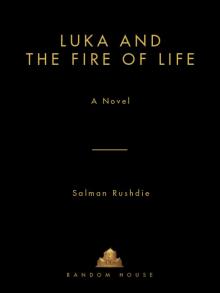 Luka and the Fire of Life
Luka and the Fire of Life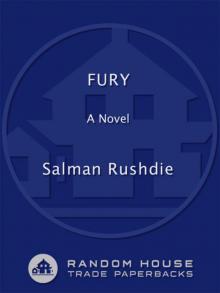 Fury Fury Fury
Fury Fury Fury Haroun and the Sea of Stories
Haroun and the Sea of Stories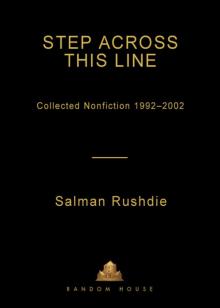 Step Across This Line: Collected Nonfiction 1992-2002
Step Across This Line: Collected Nonfiction 1992-2002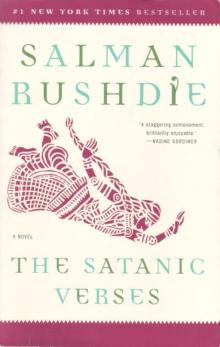 The Satanic Verses
The Satanic Verses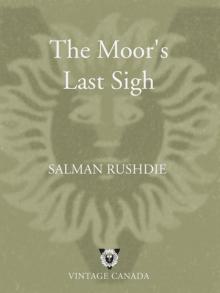 The Moor's Last Sigh
The Moor's Last Sigh The Prophet's Hair
The Prophet's Hair The Ground Beneath Her Feet
The Ground Beneath Her Feet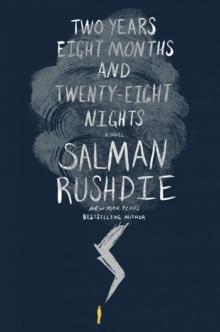 Two Years Eight Months and Twenty-Eight Nights
Two Years Eight Months and Twenty-Eight Nights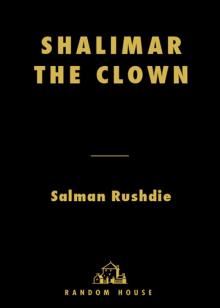 Shalimar the Clown
Shalimar the Clown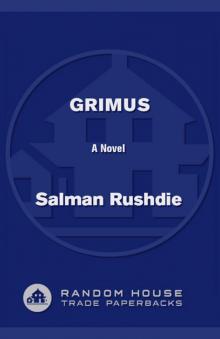 Grimus
Grimus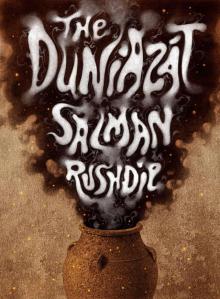 The Duniazát
The Duniazát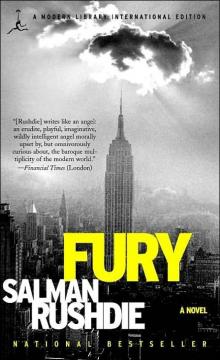 Fury
Fury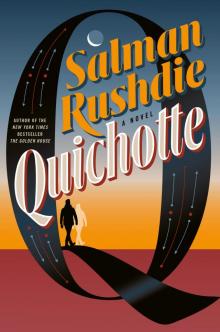 Quichotte
Quichotte The Jaguar Smile
The Jaguar Smile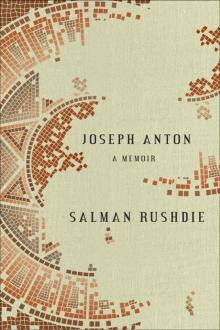 Joseph Anton
Joseph Anton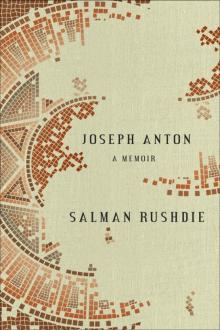 Joseph Anton: A Memoir: A Memoir
Joseph Anton: A Memoir: A Memoir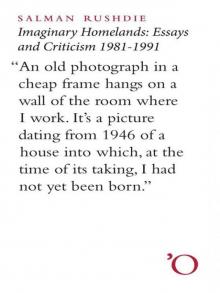 Imaginary Homelands
Imaginary Homelands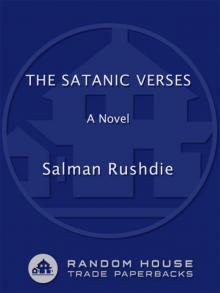 The Satanic Verses: A Novel
The Satanic Verses: A Novel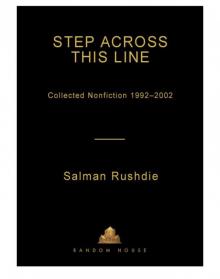 Step Across This Line
Step Across This Line East, West
East, West